
Nothing deflates your dreams of meeting last-minute quotas or cashing huge commission checks like unexpected sales objections.
We’ve all had those sales where we quickly close a huge deal with eager prospects in record time, but those are a rare, lucky treat. Most of the time, we’re getting hit with sales objections left and right. It’s how we handle those objections that separate the pros from the amateurs.
Successful objection handling means responding to a customer's objections or doubts, but without pushing them to buy. It’s a process where you listen, understand, and work together to address concerns. If you’re not skilled at objection handling, you could put hours into crafting the best sales pitch only to watch your deal circle the drain as you can’t come up with a good answer to an objection.
If you’re tired of losing deals to prospects saying, “Your price is too high,” “Now isn’t a good time,” or, “We’ll buy if you add these features,” it’s time to up your objection handling skills.
Acknowledge, Respond, Learn: Your Objection-Handling Technique
A sales objection is a rebuttal from a lead during the sales process that states why they will not be buying from you. The most common sales objections include a lack of need, a lack of trust, no budget, or no decision-making power.
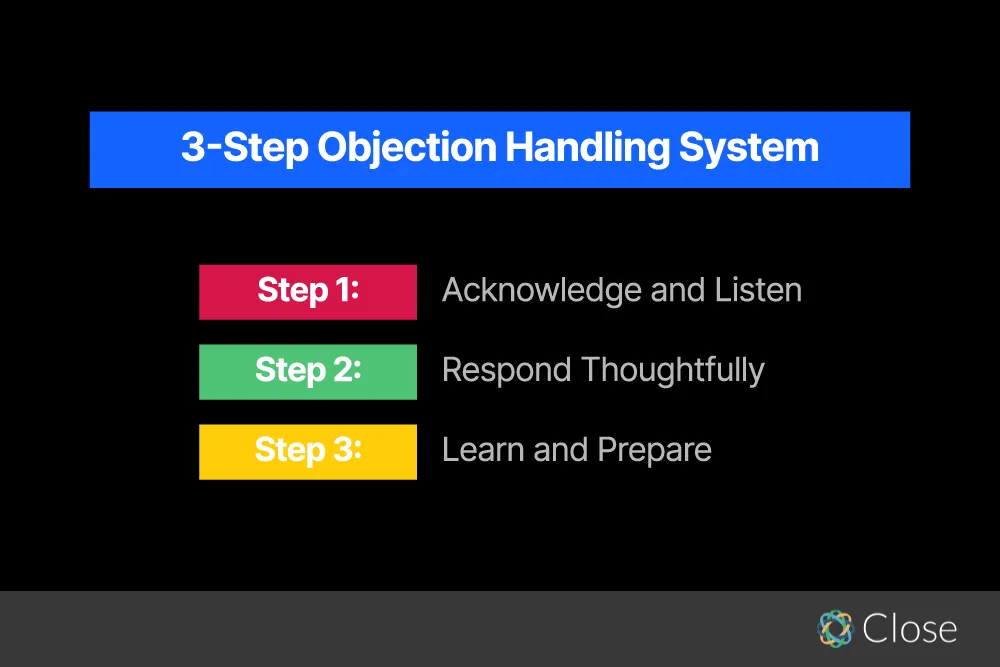 |
It’s reasonable to expect sales objections for every deal (the longer you spend in B2B sales, the more you’ll get used to them). Below is an effective objection-handling process you can use to both manage objections and learn from them.
- Acknowledge and listen
- Listen closely to the objection. Dedicate your full awareness to active listening [or reading if via email] to deeply understand what is being said.
- Ask clarifying questions about what they mean will reveal the root of the issue.
- Respond thoughtfully
- Reframe in a positive way: Reframe their objection with a positive solution. For example, “You’re the most expensive option” can be reframed as “We provide the best long-term ROI.”
- Resolve quickly: The faster you can satisfy their concerns, the more likely the sales cycle will continue. You should have “canned” answers to common objections you can quickly recite.
- Keep responses clear: Long responses can be seen as "selling" instead of addressing concerns. Keep it short.
- Don’t wing it: If you need more information, ask for it or look it up.
- Confirm you’ve satisfied the objection: Ask your potential buyer how they feel about what you’ve said, or if you’ve alleviated their concerns.
- Learn and prepare
- Log objections and how you responded in your CRM.
- Create an objection management document that lists the top 25 most common objections and a short response for each.
- Practice and memorize objection responses. Develop canned [generalized, not word-for-word] responses to quickly deliver confident, compelling responses to common objections.
- Segment by market or persona. Prospects within similar personas and markets will tend to have the same objections. Prepare for conversations by sorting prospects’ objections into groups by market or persona.
The longer you implement these techniques, the more skilled you will get at uncovering the root cause of these objections and successfully responding to them.
To help you get prepared to handle sales objections, let’s jump into some of the most common objections that all salespeople face.
The Six Most Common Types of Sales Objections (And How to Respond)
Despite the uniqueness of what you’re selling, your objections aren’t special. All salespeople face the same common objections, which is fortunate because it means you can learn from how other people deal with them.
The most common objections fall into these same six buckets:
- Lack of budget
- Lack of need
- Lack of trust
- Lack of urgency
- Lack of authority
- Hard NO
Below, we’ll break down the why behind each type of objection. Then, we’ll go over some examples and responses that you can take for your own sales team.
1. Lack of Budget: Overcoming Pricing Issues
When you hear, “Your product is too expensive,” “I need a discount,” or “We already allocated our budget for other needs,” you’re getting hit with a lack of budget objection. To overcome these, you need to remind your potential customers about the value you’re providing and make them feel like that value is worth your price.
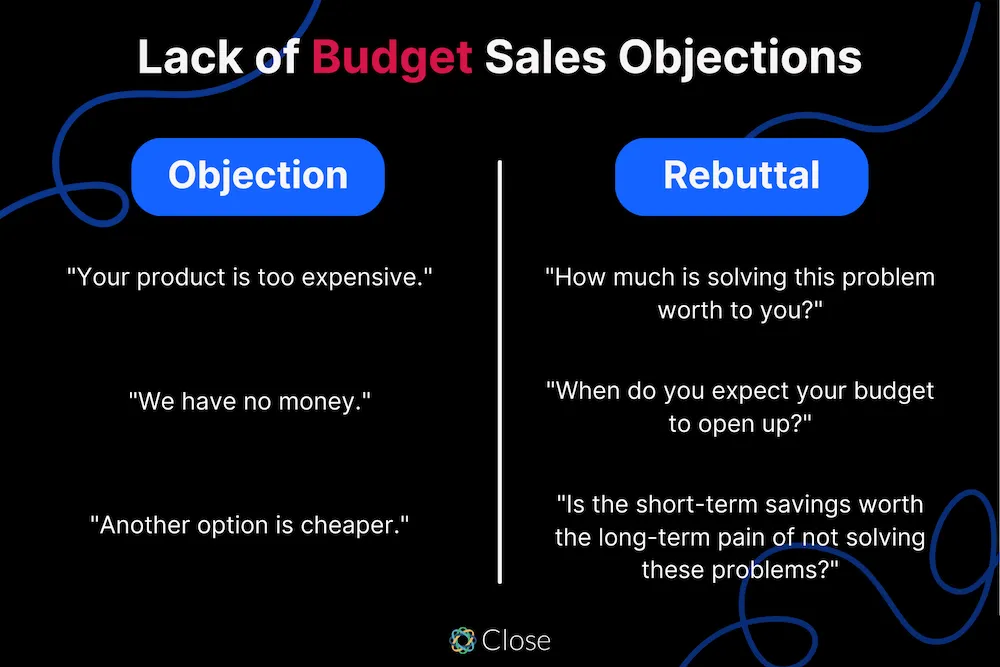 |
People often use price objections to hide other concerns or fish for a discount. If you ask the right questions, you can get to the root of a pricing objection and figure out what’s really going on. Below are some price objection examples and responses you could give.
Objection: "It's too expensive."
When a prospect says your product is too expensive, it’s often because you haven’t demonstrated enough value to justify your price.
The other possibility is that they’re using a pricing objection to mask other concerns. They could also just be trying to start a discount negotiation, and I recommend you don’t give in. The first move is to ask questions and find out what’s really going on.
This open-ended question will get your prospect to reveal some important information about how much they value your solution. You can use that information to demonstrate the value that you’re providing and help them see that the price is justified.
Objection: “We have no money.”
If the “no money” thing were a true objection, they wouldn’t be talking to a sales rep. What they really mean is that they don’t have the money right now. The best way to counter this is to find out when the budget will open up and set a date to follow up.
Objection: “I need to allocate this budget elsewhere.”
With this objection, they’re telling you they have the money, but they’re not valuing your solution over other priorities within the budget.
The best way to respond to this is to go all in on demonstrating value. You can do this by reminding them of the pain that their problem is causing and how much value you create by solving it. Testimonials, case studies, or other social proof can help hammer this down. Alternatively, you can ask for real numbers and provide projections on how much time and/or money they’ll save.
Objection: “There’s not enough ROI.”
This is another example where you need to get stronger at demonstrating value. They clearly aren’t seeing how your solution creates value, so your job here is to get super specific about how it will.
Don’t make the mistake of just repeating key product features—they heard you the first time, and saying it again won’t convince them the ROI is there. A strong case study, a referral from a product champion, or running their specific numbers and showing the projected ROI will help turn this one around.
If you can get specific numbers in your response, you’ll be better positioned to prove ROI against those numbers. And you can do so by comparing to your most successful customers.
If they provide those costs, you can say: "Our customer [name] has a similar use case and costs. Last year, they saved [X dollars] by using our product. Can I put you two in touch so you can chat about the potential ROI from using our product?"
Psst... Get our free objection handling template to start managing objections like a pro.
Objection: “Another option is cheaper.”
Your price is what it is for a good reason. If the other option was truly as good, it’s highly unlikely it would be cheaper. If it is as good and way cheaper, then either you or them are going out of business soon.
In this situation, you need to show why your solution is clearly worth more than the other option. Show them how your better and more advanced features will save them time or money, streamline processes, or create a better experience for their employees. Remind them that the other solution only solves part of your customers' concerns and that the extra investment pays off with higher ROI in the long run.
Cheaper isn't equal, and by pointing these issues out, they'll likely realize on their own that spending more on your solution is well worth it.
→ For more, check out our 18 proven strategies to overcome pricing objections.
2. Lack of Need: Reframing Your Solution to Fit Their Needs
It downright sucks to hear that your solution is “not a good fit,” as it shows that they didn’t buy into the value that you worked hard to demonstrate. Objections like these fall into the “lack of need” bucket and are usually a polite way of saying, “I don’t believe in what you’re selling.” However, they’re by no means a deal-breaker.
To get to the bottom of these objections, use critical questions to better understand what’s holding your prospect back. Then, take those responses and use them to reframe the value of your solution in a way that aligns with their stated needs.
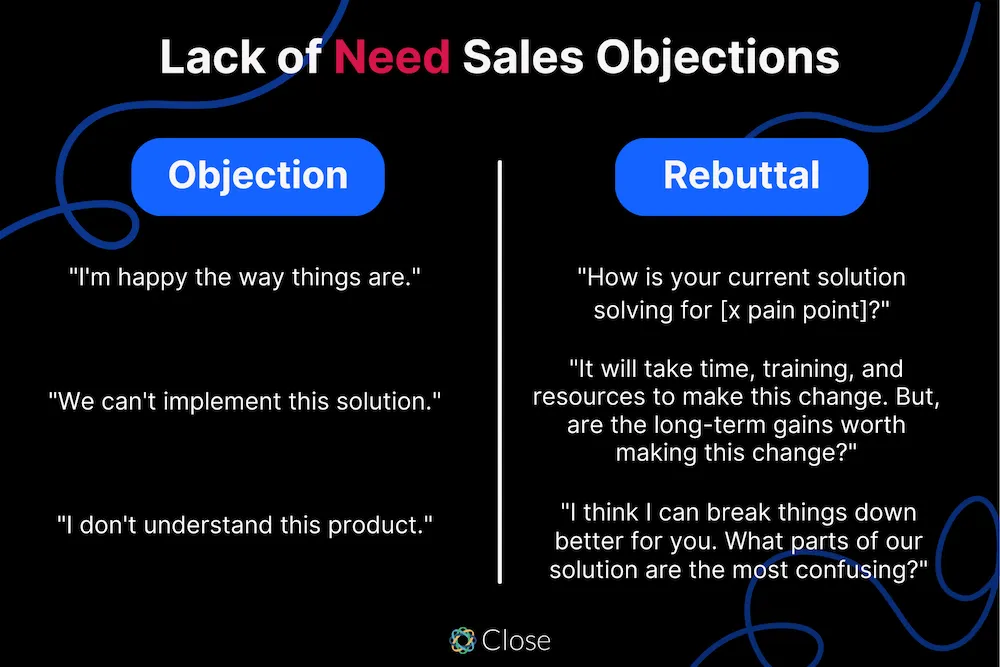 |
Objection: “We don’t have the ability to implement this solution.”
Changing old habits always takes some initial pain. For example, your prospect may have employees who are used to the old system and don’t want to deal with learning something new. This can lead them to believe they just don’t have the time or resources to make a change.
Ask them to elaborate on why it’s painful to make this change, then remind them of the long-term value that will far outweigh the short-term pain (this is a common theme in overcoming objections).
In the real world, this response would be better with an official report that shows how much they could save over a one-year period. The report can acknowledge the start-up investment and then show the possible ROI. Real numbers and tangible benefits are great at changing their point of view.
Objection: “I’m happy with the way things are.”
Every sales professional has or will encounter people who are resistant to change. A classic example (and one I’ve faced many times) is being brought in by your champion to deliver a presentation to the rest of the team. Then, a Debbie Downer who hates change will complain and say things are great the way they are.
These are people who either don’t have a problem that needs solving or are actively ignoring it. To overcome this, you need to point out the problem so obviously that even the change resisters can’t deny that it could be better.
Ask them about the most obvious thing that’s wrong with doing things the old way and have them explain it to you in their own words. Then, talk about how your solution specifically solves those problems that they just admitted to. They should at least acknowledge that things could be better, which either gets your foot in the door or reduces resistance from the hard nosers of the group.
 |
Objection: “Your solution is too complicated.”
While the prospect in this situation might feel a lack of need, what they really lack is understanding. It’s your job to simplify the problem that you’re solving and to break things down into easily understandable chunks of information.
Ask questions to understand what exactly they are confused about or why they think your product is too complicated. Then, focus on re-explaining that area they are struggling with in super simple terms. Use metaphors, analogies, and story-telling if you think it would help. You can also break processes down into simple steps. Use anything you can to make the value you provide (and how you provide it) crystal clear.
Objection: “I don’t see how your solution will help me.”
This is another situation where the prospect doesn’t see the value of your product and needs more information. However, instead of asking for that information, they’d rather throw up an objection and try to turn you away. Your job is to ask questions about their pain points so that they can see how your solution helps.
This will get them to open up about the problems you solve. If they indeed do suffer from similar problems, then they should see that your solution can actually help them.
3. Lack of Trust: Regaining Confidence You May Have Lost
Building trust takes time, and it can be hard when you're facing a skeptical prospect. At the beginning of the sales process, you’re especially vulnerable to lack of trust objections because you haven’t built a relationship yet. Asking questions and getting to the bottom of what your prospects actually need is the most reliable way to overcome these types of objections.
The following objections show that your lead doesn’t yet trust you or is generally uncomfortable moving forward. You need to get them to open up in order to successfully move forward.
 |
Objection: “Your solution is a fad and won’t last.”
If you’re selling a new type of product or service, you don’t have as much social proof to rely on. You’ll need to show that your product is going to last. I personally had this issue with one new product that my previous company sold to accountants, who are highly skeptical since they’re being marketed new products all the time.
To change their mind, share positive feedback you’ve received from similar customers and give projections about how your product can improve their metrics. You’ll need as much to convince them that you’re worth a shot.
Objection: “I’ve never heard of your company.”
Though this seems negative at first, what they’re indirectly asking for is more information about your company. This is an opportunity for you to talk about how you solve their problems and build rapport.
Give them some key points about your company, what you do, and how you can help them. Use testimonials and social proof to show that you can deliver on what you promise. Then, ask related questions about how you can solve similar problems for them.
Objection: “You've got a great product, but you’re not the industry standard.”
It’s been found that 50 percent of startups fail within the first five years. So, it’s no wonder prospects hesitate to commit to startups when they could use the proven incumbent. Your product may be better, but the industry standard is safer.
To win these people over, you must convince them that you are better than the industry standard. Ask them about how the status quo has served them so far and find out what’s not working well. Double down on how your solution solves those legacy problems and goes beyond other "standard" solutions. Position yourself as a positive change-maker who can disrupt the old ways.
Objection: “We’re already working with [X competitor].”
Knowing that your prospect is already using a competitive solution is valuable intel. You know that they’re willing to invest in solving the problems your company solves, and you should know the competitive advantages that you can exploit. The move here is to gather information about their experience with your competitor.
Ask them what’s working well, what isn’t, why they chose it, and so on. Use that information to present your product as the superior option.
Objection: “I’m already locked into a contract.”
 |
This objection implies that while the prospect is interested in your product, they don’t want to take the financial hit to get out of a contract with your competitor. In this case, get them to open up about what their ideal state would be if they were not locked in a contract. Use the info they give you to make a stronger case about why breaking that contract would be worth taking the hit over the long haul.
Follow this up with something like, “It sounds like these problems are worth solving now. Can you share the contract details with me so I can run an ROI analysis on the cost of breaking your contract vs the costs you’ll save with us?”
Objection: “I’ve heard negative feedback about your company.”
For what it’s worth, this objection is ultimately just a great conversation starter. It’s interesting to know what others are saying about your solution, and it gives you a chance to clarify a potential weak point in your own words.
Instead of scrambling to defend your company, address the claims directly and explain how that issue is being improved or completely solved. If it hasn’t been addressed, promise that you will bring it up internally and get it dealt with ASAP. Continue the conversation by asking about their specific needs in this area and speak about how you can add value.
Your goal is to change how they view your company without being combative. It’s similar to taking feedback from your manager—instead of getting defensive or bad-mouthing others, explain how you’ll do better.
4. Lack of Urgency: Get Busy Prospects to Make You a Priority
Salespeople constantly get hit with, “I’m too busy right now,” but what they’re really being told is, “This isn’t a priority.” To deal with these, you need to challenge leads with questions that get them to see that this is a high-priority problem that needs solving sooner rather than later.
You also need to be diligent about following up at the right time with valuable questions/statements rather than “just checking in.”
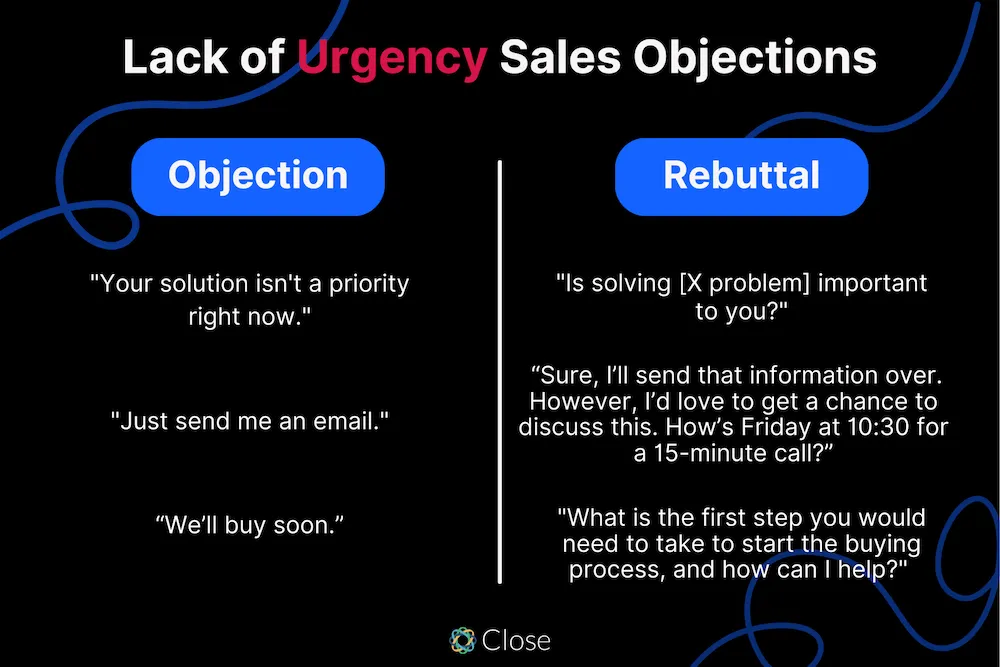 |
Objection: “Your solution isn’t a priority right now.”
When a prospect says your product isn't a priority, one of three things is true:
- You’re selling to the wrong customer.
- You aren’t pitching to your prospect’s priorities.
- Your prospect is masking their real concerns.
Ask them if the main problem that you solve is worth solving for them, and then find out more about what’s holding them back. You might find it’s a temporary budgeting issue, internal resistance to change, or something else you can work with. Or, maybe they’re just not a good fit for your product, in which case you can move on and focus on higher-quality leads.
Asking the right questions should frame your solution in a way that makes it a higher priority than they were previously thinking.
Objection: “Just email me more information, and I’ll get back to you.”
Your prospect may have good intentions when they promise to get back to you, but you’ll probably never hear from them again. When you leave follow-up to your prospects, you’re basically giving up.
Agree to send them more information, but close with a next step to have a more in-depth conversation. Alternatively, you can end the email with a question that will reveal more about their needs. Then, if they don’t answer that question, you have a reason to follow up.
Objection: “I’ll think about it.”
Prospects say they have to think about it for one of these two reasons: They're not interested, or they are interested, but not fully convinced. Either way, while they’re “thinking about it,” the deal will slip out of your hands.
Your job is to find out what they’re thinking. This is just a chance to ask more questions and uncover more needs that you can address. Get them to spill the beans and reframe your solution as the thing that will solve their painful problems.
Objection: “We’ll buy soon.”
In my days of selling to the pharmaceutical industry, some of my clients were hospitals and universities. That means some of my deal cycles lasted years (the longest was over two years). I got very used to dealing with “we’ll buy soon” objections.
What this means is that they most likely want to buy, but haven’t made formal plans to do so. They haven’t put it in the budget, contacted procurement, or done whatever they need to do to make things happen. Your job is to kick them (not literally) into gear.
Find out what specific action steps need to happen to get them to buy your product. Then, create a mutual action plan to get them over the hump. You can also walk them through the virtual close so you can better understand their buying process. The trick is uncovering the steps, then you can help them move through them.
Objection: “There’s too much going on right now—call back next quarter.”
Another common one from my pharma sales days. I recommend addressing this objection directly by asking what’s going to change next quarter that isn’t already happening now. Don’t be too aggressive, but don’t let them give you the brush-off without getting the details.
If there are legitimate reasons why they need to hold off, use your CRM to set an appropriate follow-up at the right time.
5. Lack of Authority: How to Reach the Decision-Maker
Ahhh gatekeepers, a classic sales obstacle. How do you get them to pass you on to the person who is really making the decisions? Often, they just want to avoid the potential embarrassment of allowing a salesperson to talk to their boss. They get around this by “passing the buck” and acting like their hands are tied, but we know that isn’t always true.
Logical reasoning and a clear value proposition can get your prospect to reconsider allowing you to speak to key decision-makers.
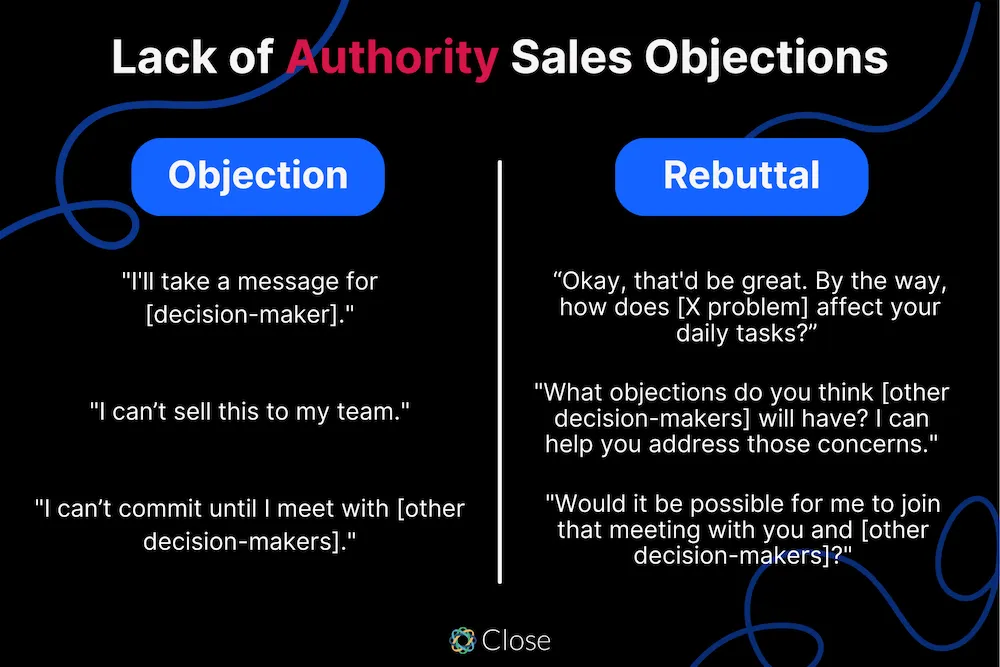 |
Objection: "I'll take a message for [decision-maker]."
Gatekeepers are living, breathing objections. They’re often the first roadblock you’ll face. How you interact with them determines the direction of the entire deal. If you play your cards right, they can become one of your most valuable assets. Get them on board with your vision, and they’ll become your internal champion.
Your best strategy is, first, to stop thinking of them as gatekeepers. After all, if you can’t win them over, how could you sell to their boss? Develop trust with them over time, and demonstrate the value you have to offer them and the company.
Respond by starting up a sales conversation with them about the problems you solve. That will make the message much more likely to reach the decision-maker and will give you some talking points for follow-up questions later if you don’t hear from them.
Objection: “I can’t sell this to my team.”
A good salesperson can arm their prospect with the information they need to counter any objections from their team. Rather than giving in to their assessment that they can’t sell you or your product, help them prepare to pitch your product to their team the same way you pitched it to them.
Objection: “I can’t make a commitment until I meet with other decision-makers.”
The larger the businesses, the more stakeholder meetings there will be. They slow down the sales process, but can also be a powerful sales tool. The trick is getting an invite.
Next time your prospect says they need to meet with other decision-makers, find out if you can attend (either in-person, by phone, or via video conferencing). This meeting could be your chance to get in front of all of the stakeholders, giving you a chance to close the deal faster.
Objection: “I’m not authorized to sign off on this.”
Turn this objection into an opportunity by asking to speak with the decision-maker directly. It’s a perfect segue into doing so. Your goal here is to get the name and contact info on who you need to speak to next.
6. Dealing With a Hard No: How to Know When it’s Time to Quit
When getting a “no,” you need to figure out if it’s a hard no or a "not now" objection. A hard no should be considered a real “no,” and not something you should keep pursuing. Doing so will damage your company’s reputation while also wasting your time—a two-for-one bad deal!
If you’re unsure whether no really means “no,” ask a clarifying question, such as:
- “Have you decided to go with another solution?”
- “Are you planning to purchase?”
The other issue reps deal with here is being ghosted. A lack of response is not the same thing as a “no,” and you’d be amazed at how thoughtfully following up with ghosters can help you later on. Even following up with a sales call just once a month or quarter can help revive a deal. Follow up with a useful tidbit of information, rather than just a boring check-in, and you’ll move higher up the priority list.
My advice is to always go for no. That means that unless you get a hard no, keep following up in a thoughtful way, even if that’s once every few months.
However, once you get a hard no, lay off completely and move on to new prospects. Don’t worry, there are billions of people in the world, and you’ll find someone else to sell to.
Objections are Usually the Beginning of Something Great
While objections can feel like a hard stop in what you were hoping was a smooth sales process, you should actually view them as useful feedback. They reveal exactly what is blocking you from moving forward, and give you the information you need to overcome them.
So, instead of being discouraged, see every sales objection as an opportunity to better understand your prospect’s concerns and overcome them.
To help you put these objection-handling tips into practice, we’ve developed a simple framework that you can swipe for free. It can help you overcome any objection (other than a hard no) and gives you everything you need to structure a solid response.










